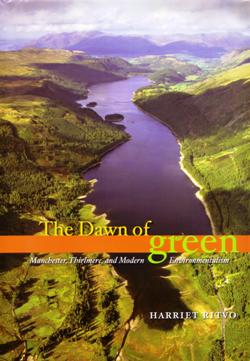
In 1875, the people living around Thirlmere, in the English Lake District, became aware of strange goings-on. Strange men in deer-stalkers and tweeds were skulking behind bushes, making notes and pretending to be tourists. Who were they, and what could they want in this backwater?
The true identity of these furtive gentlemen became known rather sooner than their employers would have liked. They were sent by Manchester Corporation – geologists among them. Cottonopolis, then the industrial capital of the world, was running dry. Its huddled masses needed to flush their new water closets, and its even thirstier mills and dyeworks needed it soft. So the City Fathers had decided to buy a lake – and to do so, if possible, without driving up land prices.
Manchester was no stranger to grandiose water schemes; but Thirlmere was another proposition entirely. Thirlmere was a Lake, sanctified by poets and artists who had gone in search of paradise and then set about defending it against encroachment by the tide of filth washing up from the industrial North (attracted mostly by their own activities). The dispute that ensued – idyllic pastoral myth versus material progress – was, as Harriet Ritvo proves in this highly engaging history, the birth of the “green” consciousness. The Lake District was an environmental Jerusalem, fought over jealously by a fractious and schismatic cabal of interests who were only barely distracted from their main activity (squabbling among themselves) by the existence of a common enemy. Plus ça change.
Mutual incomprehension was obvious from the moment the unequal battle commenced. Manchester, which not only won over Thirlmere but went on to buy Haweswater too, regarded the preservationists as élitist Luddites content to see their privileges maintained at the expense of the unwashed. The Corporation by contrast was portrayed as hell-bent upon destroying England’s most precious assets in a rapacious pursuit of wealth - dressed up as concern for the welfare of those it had enslaved.
Crucially, however, what emerged for the first time was the idea of a sense of title to landscape that transcended mere ownership. The Earth, in effect, became everyone’s property. This was the “Dawn of Green”; but what also emerged in this episode were the twin weaknesses of Green argument - hysteria and hypocrisy. If these continue to go unaddressed, they will alas prove the twilight of Green.
Reviewed by: Ted Nield
THE DAWN OF GREEN – MANCHESTER, THIRLMERE AND MODERN ENVIRONMENTALISM
HARRIET RITVO Published by: University of Chicago Press Publication date: 2009 ISBN 978-0-226-72082-1 List price: $26.00 237pp W: www.press.uchicago.edu/index.html